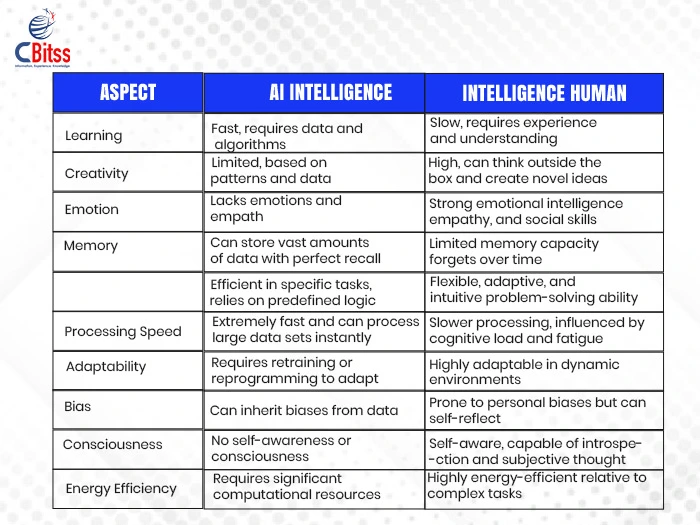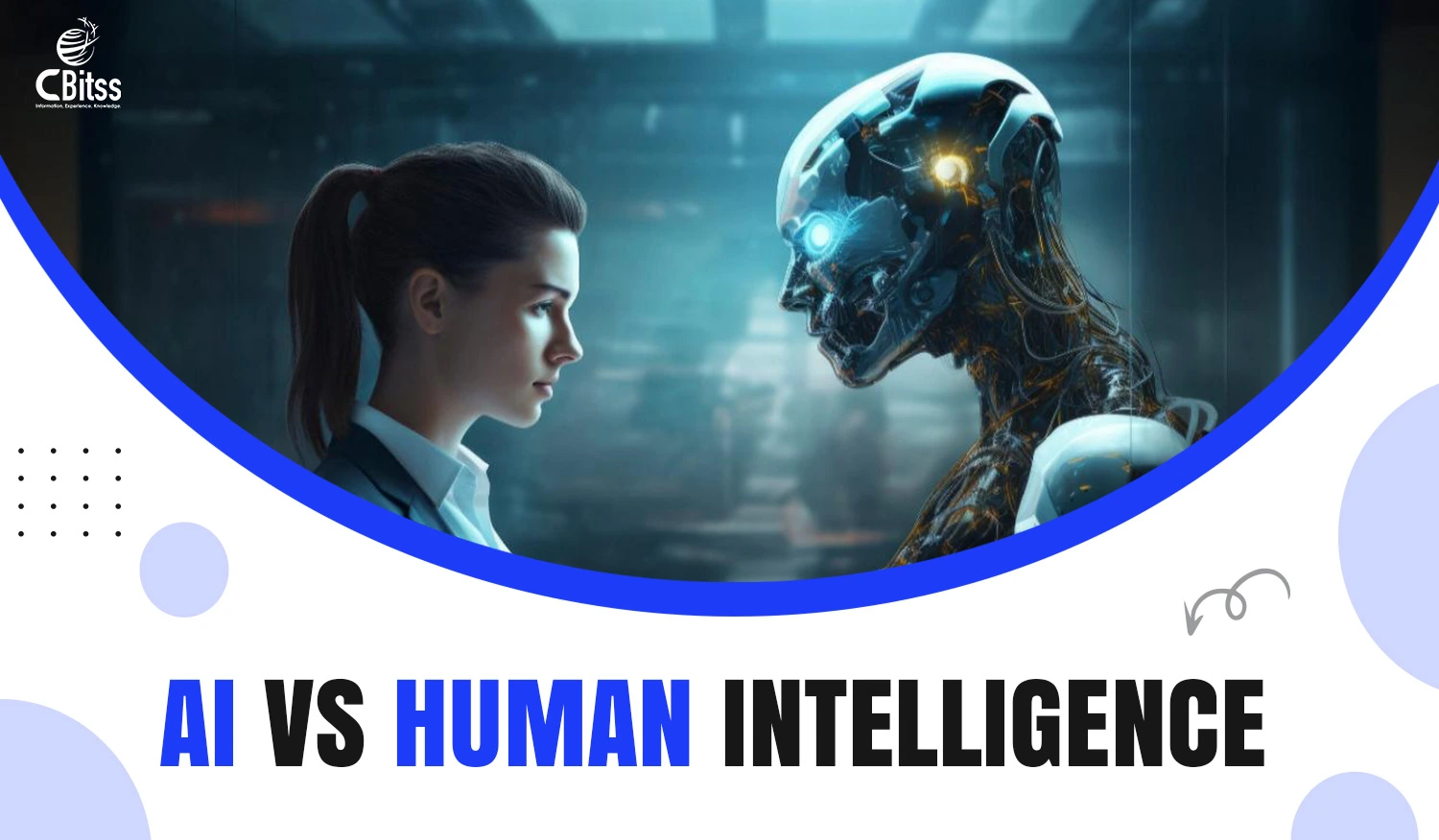Introduction
The discussion regarding Human Intelligence versus Artificial Intelligence is both of complexity as well as interesting. We should recognize both their distinctive abilities along their weaknesses. It is because this helps us admire human artistic skills and the technical capabilities of AI. We can understand these differences by examining various instances from the real world, which demonstrate the capabilities of AI vs Human Intelligence. So let’s have a look at them:
1. Creativity and Originality
Human Intelligence:
Humans are inherently creative beings. The world has been captivated by street artist Banksy due to his anonymous works, including “Girl with a Balloon” and “Love is in the Bin”. The combination of visual appeal and intellectual depth makes his artworks spark societal debates and meaningful discussions. The creative power of Banksy derives from his emotional capability to connect people to their experiences and cultural environment. The abilities that exceed AI capabilities.
AI:
AI produces artistic creations as a program, but remains incapable of producing purposeful emotional power. Through language prompts, DALL·E and MidJourney generate visually beautiful artistic creations. The creation displays excellent achievement, yet remains a product that combines already available information. What Banksy created with his shredded painting during a live performance delivered delight to international audiences worldwide – something AI cannot initiate through creativity.
2. Emotional Intelligence and Empathy
Human Intelligence:
Among all forms of intelligence, empathy stands as a trait exclusive to human beings. José Andrés established World Central Kitchen after he set an example with his culinary skills. Andrés, along with his team, responded to the devastating Haiti earthquake of 2021 and the ongoing Ukraine war by delivering more than sustenance through providing emotional care and reassuring values of community. His exceptional capacity for responding to human sorrow extends past operational requirements. It stems from genuine compassion and emotional ability.
AI:
The ability to empathize lies beyond AI’s analytical capabilities, despite its data prediction skills and relief operation optimization. The AI platform ReliefWeb uses live data analysis to help organize disaster relief efforts. This system provides valuable information, yet fails to contain the personal connection that separates World Central Kitchen from other initiatives. Although AI systems help with various activities, they fail to duplicate the comfort through combined with genuine care.
3. Adaptability and Contextual Understanding
Human Intelligence:
People hold extraordinary abilities to sense meaning within situations and change their behaviors accordingly. Shigeru Miyamoto stands out as the software developer who created the million-selling Super Mario games. He is also the creator of the The Legend of Zelda franchise. Miyamoto has established fame through the perfect synthesis of gameplay along with storytelling elements. He also incorporates the cultural references that create a universal connection with players across generations. Human adaptability shows itself through their understanding of what makes people laugh or think, or experience mental or emotional challenges.
AI:
AI struggles with context, especially in creative fields. Moreover, AI Dungeon operates as a text-based adventure game that lets AI form stories through user interactions. Despite its ability to construct entertaining stories, the programming fails to achieve logical plot coherence because it lacks the emotional understanding that naturally comes from human beings. Miyamoto designs his video games with intricate care to create seamless interactive experiences for players.
4. Learning and Problem-Solving
Human Intelligence:
Learning occurs in humans by using experiences together with instinctual understanding and experimental processes. The space journey of Dr. Mae Jemison marked her historic position as the first African American woman astronaut. She accomplished more by breaking down social barriers while motivating people of the future to conquer human potential limits. Human curiosity combined with determination enables people to achieve remarkable things.
AI:
The operation of AI occurs by processing data through algorithms. AlphaFold stands as an artificial intelligence system developed by DeepMind that now produces accurate predictions of protein structures. This revolutionary accomplishment relies on examining past information instead of using human-like problem-solving capabilities. This ability of AI exists without the ability to understand human vision or display human curiosity, which fuels creative innovation.
5. Ethics and Moral Judgment
Human Intelligence:
People possess a moral direction that develops from their exposure to cultural elements and personal choices, and life experiences. People throughout the world became more aware of climate change activism through Greta Thunberg. Through her passion combined with ethical understanding and behavioral awareness, Greta Thunberg motivates millions to act against climate change. Her presentations extend beyond facts because she shows audience members their joint planet stewardship roles.
AI:
The capability of AI systems extends to data analysis for suggesting remedies. But they lack the ability to resolve ethical dilemmas independently. IBM Watson, along with other AI systems, enables medical diagnosis and treatment suggestions. Yet, they lack the capability to comprehend moral considerations in patient care decisions. A medical decision needs to be made about administering experimental treatment to patients. No other species possesses the ability to reply to these matters.
6. Cultural Sensitivity and Diversity
Human Intelligence:
People grasp the multiple facets of cultural differences and diversity. Through her novel “Half of a Yellow Sun,” Nigerian writer Chimamanda Ngozi Adichie presents African historical facts. It also includes complex cultural elements of her native identity. Her storytelling reaches international audiences because she showcases global themes through stories based on her traditional cultural heritage.
AI:
Artificial intelligence demonstrates limited knowledge of cultural sensitivity principles. The language translation services provided by Google Translate commonly miss out on cultural subtleties. Direct linguistic translation of proverbs may discard key semantic aspects as well as the cultural framework. AI helps with cultural tasks, yet lacks the capacity to grasp the complexity of human cultural experiences in its entirety.

A Harmonious Coexistence
Artificial Intelligence and human intelligence operate as allies instead of foes in modern society. Computer processing of data and problem-solving automation join forces with human emotional intelligence and ethical decision-making, and creative capabilities. The partnership between these two allows humans to tackle exceptional tasks that include disease cures alongside space exploration.
The goal should be to make AI and Human Intelligence collaborate so both perform better instead of establishing a competition.
The future that we should aim for is highly inspiring in this way. If you want to become a part of this future, then you can enroll in our artificial intelligence course in Chandigarh, the education hub for all aspiring professionals and know about AI vs Human Intelligence in depth.
FAQ’s on AI vs Human Intelligence
- What is the comparison between AI and the human brain?
Although AI processes data faster, the human brain excels in creativity, emotions, and contextual understanding. Thus, making it uniquely adaptable and intuitive. - Can AI learn and adapt as quickly as a human brain?
AI learns from data but lacks the human brain’s ability to adapt instantly to new, unstructured situations or think outside predefined patterns. - Can artificial intelligence cause harm to the brain?
AI itself doesn’t harm the brain, but over-dependence on AI tools may reduce critical thinking and creativity. - Can AI replicate human emotions and empathy?
AI can simulate emotions but cannot genuinely feel or understand empathy like humans, as it lacks lived experiences and emotional depth.


